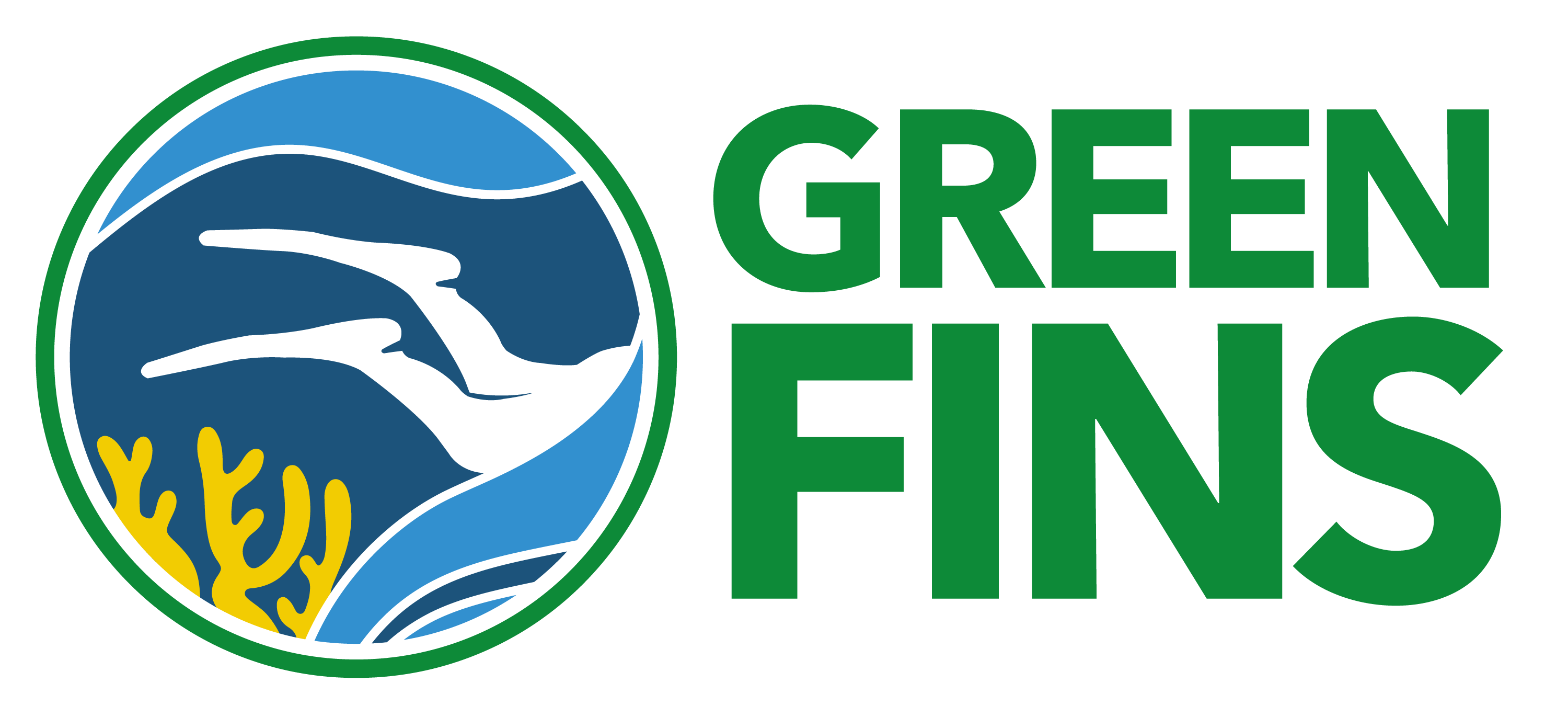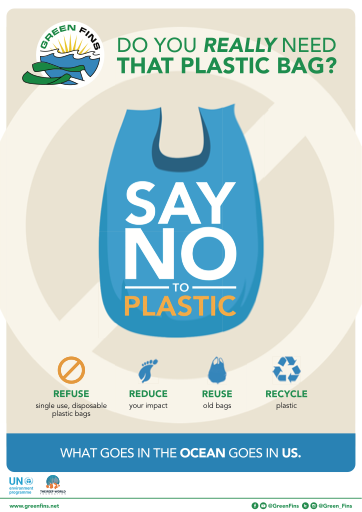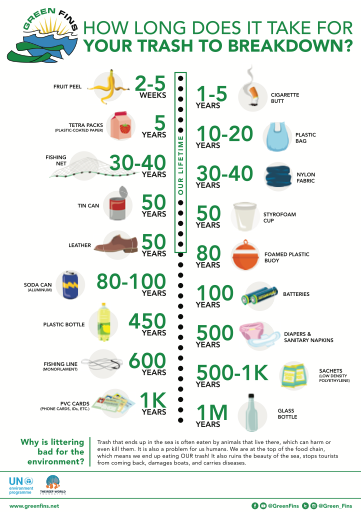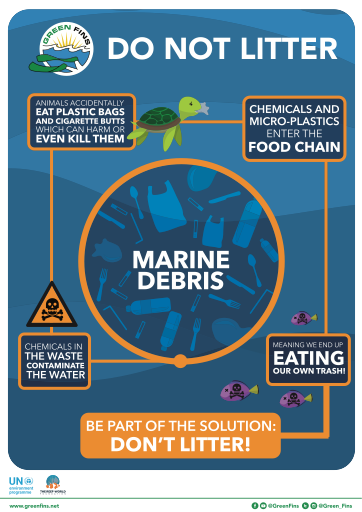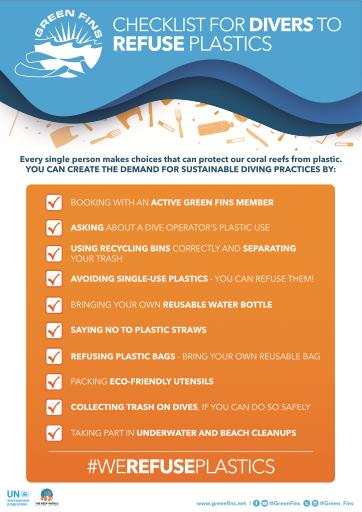As countries are slowly opening up for tourism again we have to keep safe travelling in mind as well as do our part to protect the environment.
There’s one thing everyone can do, collectively or individually, to reduce single-plastic use in tourism. We all know by now that plastics are terrible for the environment and many of us have seen the destruction they cause when they get washed into the ocean. Threats such as entanglement and ingestion by marine animals (remember corals are animals too) can be devastating.
But fret not, Green Fins has prepared a plastic checklist to help dive operators run coral-friendly business so the industry can come back better! Healthy corals = a healthy ocean, and that means more amazing dives.
1. Serving food and drinks in reusable containers
Before getting to their destinations, guests are already exposed to many instances of having to use single-use plastics during their journey. From in-flight meals served in single-use plastic containers to earphones packaging and amenity kits.
Also, while Covid-19 is still ongoing, personal protective equipment (PPE) such as face masks and face shields will be required while travelling. However, your operation can cut that chain by serving food and drinks in reusable containers. An added bonus: It can save your business more money in the long run too!
FACT: 129 billion face masks and 65 billion gloves are used every month of the pandemic.

2. Avoid single-use bottles, straws, stirrers and sachets
Similar to serving drinks and food in reusable containers, avoid selling drinks in single-use plastic bottles. Instead, provide guests with personal reusable bottles when they check-in. Having a drink station with a water dispenser, glasses, sugar and creamer in jars (instead of sachets), reusable straws and stirrers will make it convenient for your guests too. We live in a time where alternatives to single-use plastic are readily available making this an easy change to put in place.
FACT: It has been estimated that over five trillion pieces of plastic currently litter our ocean.
3. Recycling and separating trash
By providing clear separated trash bins for general waste, recyclables and biodegradables, you make it easier and faster for your team when the time comes to recycle what you‘ve collected. This will also help to reduce contamination of the recyclable materials. While recycling is not the ultimate solution to plastic pollution, it is still essential. It reduces the amount of waste sent to landfills and reduces waste overspilling into the waterway and finally the ocean.
FACT: Recycling saves 25-30% of the energy used to make glass from virgin materials.
4. Letting guests know how to dispose of their trash as part of boat briefing
Giving a boat briefing is especially important for your new guests. Include not littering and show them how to dispose of their trash properly while on board. While it’s important to point out where the emergency oxygen is, it is also important to show them where they can find the trash bin so their waste doesn’t get thrown overboard and become a threat to the ocean.
TIP: A dive crate is not always an adequate trash bin! We recommend something wind-proof with a lid.
5. Providing the right sized bins with lids in the dive shop and boat
Depending on the size of your operation, whether a dive shop or boat, make sure you provide adequately sized trash bins with lids. They are invented for a reason, so people don’t have to put up with the bad odour of trash AND to avoid trash overflowing from the bins. Especially on moving dive boats where trash can fly out of the bins with no lids. If small-sized bins are the only type available in your location, provide more of them in multiple locations where appropriate. There’s no harm in having a bin in the front and the back of the boat!
6. Making sure trash from boats is safely removed and disposed
At the end of the day or trip, make sure the trash from the boat is safely removed and disposed of. While the boat is no longer on the move, it is still floating on the water and removing the trash from the boat ensures that it doesn’t end up in the ocean accidentally. That also keeps the boat clean and ready to roll for the next trip!
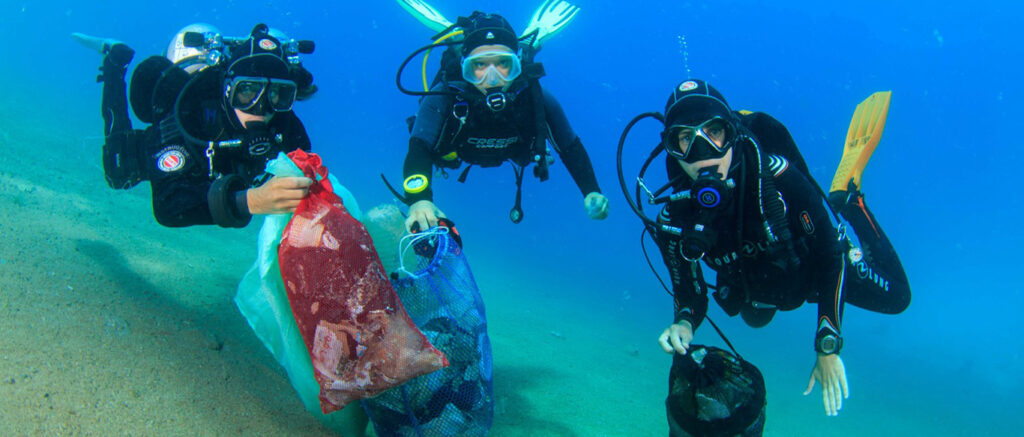
7. Students and divers look up to dive professionals as role models and copy what they do
Don’t turn a blind eye to the fishing line that is entangled in the coral or the can of soda stuck between rocks. Imagine the positive impact it can have on the ocean if every diver collects the trash they encounter on every dive. Remember to help your divers with stability or buoyancy if they are struggling to collect litter to avoid further damage to the reef.
8. Hosting regular underwater and beach cleanups with the community and guests
Marine debris whether it is underwater or on land poses a threat to our environment. As we know, plastics never really go away. They only break down into small pieces called microplastics that are harmful to our ocean, marine life and humans (they end up in our food too!). Organizing regular beach and underwater cleanups such as Dive Against Debris is a great way to reduce pollution in the ocean and collect important data on the subject.
If something is being done often enough it’ll eventually become a habit. Who knows, your cleanup activities might even inspire some of your guests to organize their local cleanups when they are back home! Share the Green Fins cleanup guidelines with them for more ideas on how to run a cleanup event.
9. Sharing pictures of cleanups on social media
Not only is it great for publicity, sharing good examples on social media might encourage and inspire other dive operators to follow in your footsteps too. It is also a great way to promote your cleanup activities that will result in more people joining. The more people are cleaning up, the less pollution in the ocean!
TIP: You can also register your event on the new PADI Conservation Activities Locator.
10. Displaying Green Fins posters
You can find a number of Green Fins posters related to plastic pollution on the website and download them for free to display in your dive shop or boat. While plastic pollution is not new, many aren’t aware of the problems they could cause especially if they are at the bottom of the ocean and away from eyesight. Displaying posters can bring awareness to the issue and encourage people to work together to find solutions in combating plastic pollution.
TAKE ACTION IN JULY
To celebrate #PlasticFreeJuly, download the Green Fins Plastic Checklists for Divers and Operators posters and share them with your staff, colleagues and divers as part of their pre-trip information. Let’s all work through the checklist to reduce single-use plastic in tourism!
This article is reposted with permission from PADI as a partnership collaboration with The Reef-World Foundation. Click here to see the original blog.
